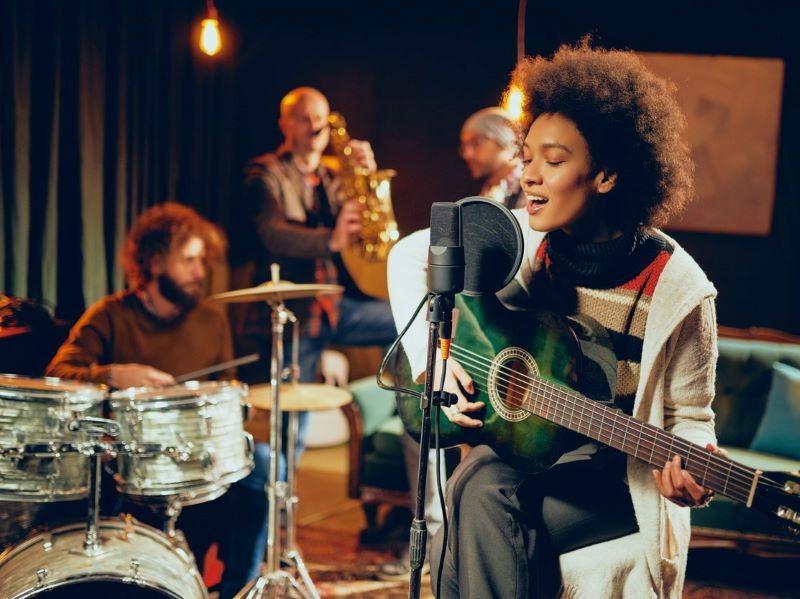Creating and performing music can be a powerful tool in building communities in a variety of scenarios. Following the pandemic, feelings of well-being among both students and teachers and a sense of community on campus have been eroded. Students and staff returning to campus may benefit from engaging in collaborative music projects to rebuild their communities.
My own experience over many years in the UK, working with excluded pupils and young offenders, has shown me that even those considered to be the most “difficult to reach” and resistant to formal learning will engage with education through the use of music. Although the trauma of the pandemic has not fostered an equivalent resistance in the majority of students, there are still bridges to be rebuilt, and playing music can be a highly effective means of achieving this.
- How to reconnect in a changed world
- Singing on mute: facilitating practical creative work online
- How to foster collaboration among students trained to compete
Playing in bands can be an incredibly rewarding experience for students. Many young people who are highly proficient in playing instruments have not had the experience of working in groups where “jamming” (improvising) and co-creating original music is the chosen approach. Not only can this be a profoundly enjoyable collective experience, but it can help to foster collaborative skills that are essential in higher education, in the workplace and, for language learners, provide a context for additional language practice.
For teachers, facilitating these activities can be equally rewarding. My experiences mentoring student bands in China has involved creating ensembles featuring Chinese and international students of various nationalities working collaboratively. Some of these bands integrated Western and traditional Chinese instruments, which expanded my own musical knowledge, and I also took great satisfaction in witnessing students with no previous performance experience taking the stage at high-profile music festivals to crowds of thousands.
However, far more important than these prestigious events was the hosting of performances on campus. These small concerts where staff and student musicians and ensembles performed and socialised together contributed to an increased sense of community at the university. These events took place pre-Covid, when community and collective well-being were not under the strain they are now. As staff and students return to campus post-pandemic, encouraging musical collaboration and holding performance events on campus may be more important than ever.
For teachers considering initiating music projects, several issues may need to be considered:
How will the band make decisions? If you are working in a society where groups usually operate with a leader, many students will expect you as the teacher to take that role. In other scenarios, students with social status may expect to lead on decision-making. The group may therefore need to be encouraged and guided to take decisions collectively.
How will you ensure that musicians play for the band and not for themselves? In cultures where virtuosity is held in high esteem, playing a minimal role in a collective musical endeavour may not immediately appeal to everyone. Discussing the importance of minimalism and space in music might be useful. Developing the ability to work in a team is also a key transferable skill that students will need in their studies and subsequent working life. In some cultures, students may have little prior educational experience of collaborative working and group assessments. Participating in a band project may help develop their abilities in these areas.
How will you encourage band members to improvise? For those students who have received formal training in their instrument, and particularly those who are used to reading sheet music, jamming may be an unfamiliar experience. Learning (or unlearning) to create music in this fashion may require encouragement. The ability to experiment and generate original ideas is a key academic and professional skill. Similarly, learning to embrace getting things “wrong”, and to reflect and learn from perceived mistakes will serve students well in their studies and beyond.
How will you ensure that the music and lyrics are appropriate? A paradoxical issue that can arise when using music to engage young people is that certain “underground” genres can encourage a culture of resistance, including towards formal learning institutions. Similarly, controversial or offensive lyrical content can prove a divisive issue. This is a delicate subject to navigate, but one that can provide a rich context for a critical discussion of a range of issues. The ability to consider a problem from a variety of perspectives and adopt a nuanced position is another key skill that can also serve students well inside and outside the classroom. Teachers will need to take particular care to guide discussions and ensure that all voices are heard and debate is undertaken in a sensitive manner, but the benefits to students could be invaluable.
How will you ensure that joining a band does not negatively impact students’ studies? Balancing various activities and effectively managing their time is one of the most important skills that students need to develop. Fortunately, as well as providing an opportunity to de-stress and enjoy themselves, joining a band can help students develop a variety of skills that could enhance their studies and their lives in general.
Finally, you will need to decide on a good band name. Best of luck!
Nick Merwitzer, senior language lecturer, Xi’an Jiaotong-Liverpool University.




comment